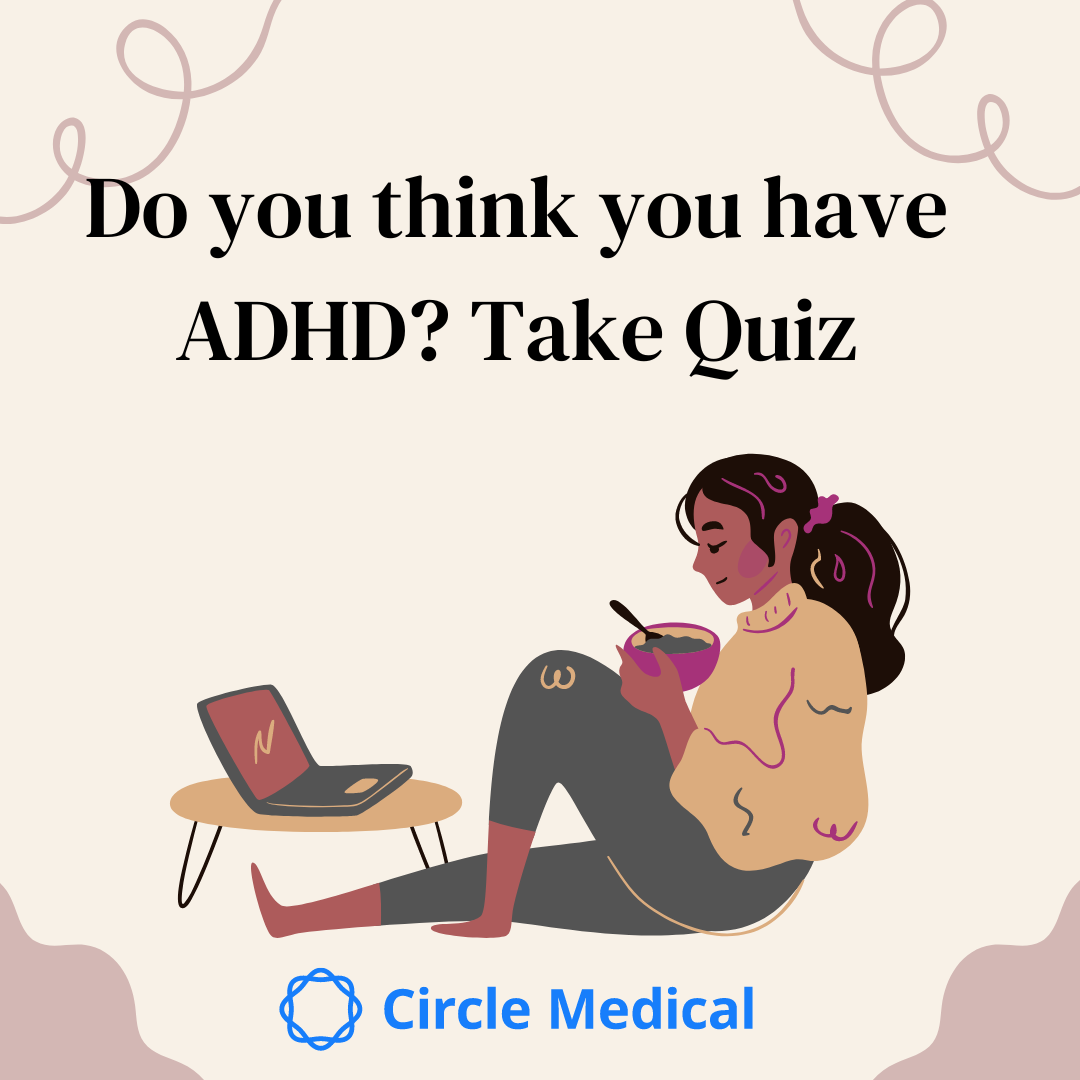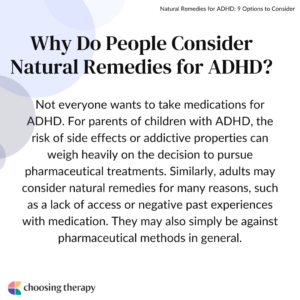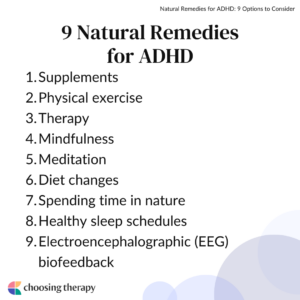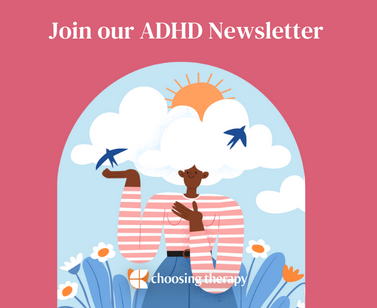Natural remedies for ADHD can prove beneficial when combined with traditional approaches, like medication and therapy. Alternative treatments for ADHD can aid in symptom management for individuals who respond poorly to medication or seek to introduce healthy habits into their lives. Physical activity, nutrient-rich diets, and mindfulness techniques are examples of holistic and natural options.
Online Psychiatry For ADHD Covered By Insurance
Talkiatry can match you with a real psychiatrist who takes your insurance and is seeing new patients. They’re in-network with major insurers and offer medication management. Get started with a short online assessment
Side Effects of ADHD Medications
Treatment for ADHD tends to include medication despite mixed research regarding efficacy.1 Some research suggests stimulants or non-stimulants are beneficial, while other findings contradict these claims.1 One study showed behavioral interventions and exercise yielded similar results to medications.1
Today, the gold standard for the treatment of ADHD includes the combination of prescription stimulants and behavioral therapy. However, these medications carry the risk of adverse effects, and some may not be suitable for children, teens, or individuals with pre-existing mental or physical health conditions.
Side effects of ADHD medications may include:2
- Loss of appetite
- Difficulty sleeping
- Irritability
- Moodiness
- Headaches
- Stomachaches
- Increased heart rate
- High blood pressure
Why Do People Consider Natural Remedies for ADHD?
For many individuals with ADHD, pharmaceutical treatment can offer relief from unwanted symptoms. However, not everyone wants to take medications for ADHD. For parents of children with ADHD, the risk of side effects or addictive properties can weigh heavily on the decision to pursue pharmaceutical treatments.
Similarly, adults with ADHD may consider natural remedies for many reasons, such as a lack of access or negative past experiences with medication. They may also simply be against pharmaceutical methods in general.
9 Natural Remedies for ADHD
Alternative treatment for ADHD can be beneficial for those who would like to experience symptom relief without relying on a prescription. However, individuals should explore their options and consult a doctor before determining the best treatment method. Common holistic treatments for ADHD include mindfulness, exercise, and therapy.
Below are nine natural remedies for ADHD:
1. Supplements
Treating ADHD naturally may not be entirely possible, but some supplements can be effective in helping individuals manage their ADHD symptoms. Polyunsaturated fatty acids, particularly omega-3, can be beneficial for mild cases of ADHD and as an adjunctive treatment for more severe cases.3
Individuals may also consider herbal remedies for ADHD, such as Ginkgo biloba and St. John’s Wort.3 However, little evidence suggests these can improve ADHD symptoms.
Supplements may cause unwanted side effects and dangerous interactions when used with other medications. Because of these risks, consult your healthcare provider before starting a new supplement.
Supplements that may reduce ADHD symptoms include*:4
- Melatonin: Melatonin may help reduce sleep disturbances, such as ADHD insomnia.
- Zinc: While more research is needed to confirm the effectiveness of Zinc for ADHD symptoms, this mineral may help if a person has a deficiency.
- Iron: Like Zinc, this supplement may benefit those with Iron deficiency.
- Magnesium: Magnesium may help reduce hyperactivity and irritability.5
- Omega-3: Fish oil supplements may improve mild symptoms of ADHD.
*Dietary supplements (including vitamins, supplements, herbs, and natural medicines) are not regulated the same way as medications by the FDA. These products do not have to have clinical trials to determine their safety and efficacy before they are sold. You should consult your doctor or pharmacist before starting any new dietary supplement.
2. Physical Exercise
Exercise can improve mental health, particularly for individuals with ADHD. One study found children who took Tai Chi classes twice weekly experienced an improvement in their ADHD symptoms.6 Another case reported participants who used a treadmill for 20 minutes scored better on a computer game than those who read beforehand.1
Those struggling to implement exercise into their routines may consider daily walks or attending yoga classes. Alternatively, they can consider ecotherapy or adventure therapy to reap the benefits of both physical activity and psychotherapy.
Benefits of exercise for those with ADHD include:
- Decreased anxiety
- Improved conduct
- Decreased negative emotions
- Decreased hyperactivity
- Less “daydreaming”
- Improved ability to cope with stress
3. Therapy
Therapy is an evidence-based treatment for ADHD, with or without the addition of medication.7,8 Behavior therapy is a common and popular option, especially for children with ADHD.8 Finding a neurodiversity-affirming therapist is best, as these professionals understand the nuances of ADHD and can provide advice about natural remedies. You can search for a provider in an online therapist directory or ask your doctor for a referral.
Therapy options for ADHD may include:
- Cognitive behavioral therapy (CBT): CBT for ADHD helps individuals address thoughts that contribute to unwanted behavior, such as procrastination or poor task management.
- Dialectical behavior therapy (DBT): DBT mainly incorporates skill training to help clients better manage and tolerate emotional distress. Additionally, DBT can assist with problem-solving strategies to identify and replace maladaptive behaviors with more effective alternatives.
- Family therapy: Family therapy can help with issues related to an ADHD diagnosis within the family.
- Behavior therapy: Behavior therapy focuses on turning negative, unwanted behaviors into positive ones. For example, parents can create a reward system that promotes specific behaviors.7 Parents can also learn how their behavior impacts their children, promoting a healthy parent-child relationship.
Get Help For ADHD
Talkiatry can match you with a real psychiatrist who takes your insurance and is seeing new patients. They’re in-network with major insurers and offer medication management. Get started with a short online assessment
Inflow App – Inflow is the #1 science-based app to help you manage your ADHD. Their support system helps you understand your neurodiverse brain, and build lifelong skills. Free Trial
4. Mindfulness
Mindfulness means focusing attention on thoughts, feelings, and bodily sensations to increase self-awareness in the current moment.9 Practicing mindfulness may help improve some ADHD symptoms by fostering the ability to self-observe and remain focused.9 Further, mindfulness techniques can help individuals train their attention and develop effective responses to stress. Mindfulness can be performed “on the go” and does not require setting aside time for practice.9
5. Meditation
Meditation refers to a group of techniques that focus on the mind-body connection. Meditation and mindfulness are related concepts, but meditation for ADHD incorporates a formal practice for a certain length of time.10
Meditation thickens the prefrontal cortex involved in focus, planning, and impulse control, helping reduce inattentive and impulsive symptoms.11 Additionally, meditation raises dopamine levels in the brain, a neurotransmitter known to be in short supply for those with ADHD.11
6. Diet Changes
Diet changes cannot cure ADHD but may impact behaviors.12 For instance, certain foods appear to worsen ADHD symptoms, particularly in children.13 Whether food colorings and artificial additives contribute to ADHD is still unknown.13
However, eliminating these from your diet and monitoring any improvement may be beneficial. Consider replacing sugar-sweetened beverages, candy, and colorful cereals with more wholesome, fresh foods.13
7. Being in Nature
The benefits of nature on mental health are numerous. Some studies suggest time outside can increase the ability to concentrate, which can be especially helpful for those managing symptoms of ADHD.4
A separate survey found children with ADHD who participated in various outdoor activities appeared to exhibit a reduction in symptoms.14 If you cannot find time to go outside, try placing your work desk by a window to improve your attention.14
8. Healthy Sleep Schedules
Sleep quality significantly impacts health, mood, energy, and cognitive functioning. Sleep problems are common among those diagnosed with ADHD. However, experts suggest an extra thirty minutes of sleep can help prevent children from becoming restless during school.1
9. Electroencephalographic (EEG) Biofeedback
Electroencephalographic (EEG) biofeedback–now called neurofeedback or neurotherapy–monitors and provides real-time data on physiological responses, including muscle tension, heart rate, sweating, breathing, and brain waves.15 Many with ADHD exhibit low levels of arousal in the frontal areas of the brain, and biofeedback is an intervention that may help train the brain to increase these levels, leading to reduced ADHD symptoms.15
In My Experience
Additional Resources
To help our readers take the next step in their mental health journey, Choosing Therapy has partnered with leaders in mental health and wellness. Choosing Therapy is compensated for marketing by the companies included below.
ADHD Management Tools
Inflow App Inflow is the #1 science-based app to help you manage your ADHD. Their support system helps you understand your neurodiverse brain, and build lifelong skills. Free Trial
Online Psychiatry
Circle Medical – ADHD Diagnosis and Treatment. Affordable and accessible ADHD evaluations and treatment, including possible controlled substances medication if clinically appropriate. Diagnosis and prescription over video. Insurance accepted. Same & next day appointments available. Visit Circle Medical
Online Therapy
BetterHelp Get support and guidance from a licensed therapist. BetterHelp has over 20,000 therapists who provide convenient and affordable online therapy. Take A Free Online Assessment and get matched with the right therapist for you. Free Assessment
Free ADHD Newsletter
A free newsletter from Choosing Therapy for those impacted by ADHD. Get helpful tips and the latest information. Sign Up
Choosing Therapy Directory
You can search for therapists by specialty, experience, insurance, or price, and location. Find a therapist today
Do you think you have ADHD? Answer an evidence-based questionnaire for Circles Medical to learn more. Takes 45 seconds.
Best Online Psychiatry Services Online psychiatry, sometimes called telepsychiatry, platforms offer medication management by phone, video, or secure messaging for a variety of mental health conditions. In some cases, online psychiatry may be more affordable than seeing an in-person provider. Mental health treatment has expanded to include many online psychiatry and therapy services. With so many choices, it can feel overwhelming to find the one that is right for you.








